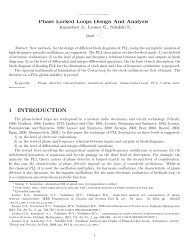Technical Sessions – Monday July 11
Technical Sessions – Monday July 11
Technical Sessions – Monday July 11
You also want an ePaper? Increase the reach of your titles
YUMPU automatically turns print PDFs into web optimized ePapers that Google loves.
4 - Adaptive Large Neighborhood Search for Service Technician<br />
Routing and Scheduling Problems<br />
Richard Hartl, Dept of Management, University of Vienna,<br />
Bruenner Str. 72, A-1210, Vienna, Austria,<br />
richard.hartl@univie.ac.at, Attila Kovacs, Sophie Parragh, Karl<br />
Doerner<br />
We define the service technician routing and scheduling problem with and without<br />
team building. Technicians must complete a set of service tasks with time<br />
windows. Each technician has different skills at different levels and each task<br />
demands technicians with the required skills. Sometimes technicians have to<br />
be grouped into teams for completing complex tasks. The objective is to minimize<br />
total routing and outsourcing costs. Using an adaptive large neighborhood<br />
search algorithm, high quality solutions are obtained within short computation<br />
times for both, artificial and real world instances.<br />
� MB-10<br />
<strong>Monday</strong>, 14:00-15:30<br />
Meeting Room <strong>11</strong>1<br />
Strategic Network Design for Time-sensitive<br />
Networks<br />
Stream: Time-Definite Logistics<br />
Invited session<br />
Chair: Anne Lange, Operations Planning Acc. & Control, Technische<br />
Universiteit Eindhoven, Faculteit Industrial Engineering &<br />
Innovation Sciences, Postbus 513, 5600 MB, Eindhoven,<br />
Netherlands, a.lange@tue.nl<br />
1 - A New Method for a Cost-oriented Robust Supply Chain<br />
Design<br />
Thomas Makuschewitz, BIBA - Bremer Institut für Produktion<br />
und Logistik GmbH at the University of Bremen, Hochschulring<br />
20, 28359, Bremen, Germany, mak@biba.uni-bremen.de, Bernd<br />
Scholz-Reiter<br />
A robust supply chain design is given by the capability of the network to cope<br />
with expected and unexpected changes of key parameters. In this talk we measure<br />
the robustness with the stability radius that reflects the smallest perturbation<br />
of parameters that destabilizes the network. Based on a fluid approximation<br />
of a multiclass queueing network and findings concerning the stability<br />
radius we present a method for a robust network design. This method allows<br />
finding the number of production locations, the allocation of production steps<br />
and capacities that maximizes robustness for given costs.<br />
2 - Integrated Bio-refinery and Forest Products Supply<br />
Chain Network Design<br />
Sophie Damours, Mechanical Engineering Dept, Université<br />
Laval, 1065 Avenue de la Medecine, Pavillon Pouliot, G1V 0A6,<br />
Quebec, Canada, Sophie.damours@forac.ulaval.ca, Yan Feng,<br />
Luc LeBel, Mustapha Nourelfath<br />
We present a mixed integer programming model to support the design of the integrated<br />
bio-refinery and forest product supply chain. A general market-driven<br />
supply chain network structure is proposed allowing the optimal investment decisions<br />
to be made in choosing the right facilities, technologies, capacities, and<br />
their locations, that strategically maximize the supply chain value. In the model<br />
development, the biomass and energy supply decisions are also considered as<br />
decision variables. The model is validated using an experimental case. It is<br />
used to analyse the need for timely policy making.<br />
3 - Integrated Scheduling of Production and Distribution<br />
Operations for Rapidly Perishable Products<br />
Tsung-Sheng Chang, Graduate Institute of Logistics<br />
Management, National Dong Hwa University, 1, Sec.2,<br />
Da-Hsueh Rd., Shou-Feng, 974, Hualien, Taiwan,<br />
ts@mail.ndhu.edu.tw, Ya-Ching Lin<br />
The major challenge faced by perishable-product logistics managers is how to<br />
control the quality of perishable products since they continuously and often<br />
rapidly decay throughout the supply chain. This research thus seeks to deal<br />
with the time-sensitive issue of managing perishable-product logistics by effectively<br />
integrating the scheduling of production and distribution operations.<br />
The integrated problem is NP-hard, and involves combining various logistics<br />
activities. Therefore, this research develops decomposition-based approaches<br />
to solve the problem.<br />
IFORS 20<strong>11</strong> - Melbourne MB-<strong>11</strong><br />
4 - Frequency Driven Strategic Design for Less-thantruckload<br />
Networks<br />
Anne Lange, Operations Planning Acc. & Control, Technische<br />
Universiteit Eindhoven, Faculteit Industrial Engineering &<br />
Innovation Sciences, Postbus 513, 5600 MB, Eindhoven,<br />
Netherlands, a.lange@tue.nl<br />
Less-than-truckload transportation benefits from frequent terminal departures.<br />
Network optimization models integrating frequencies exist, but strongly rely<br />
on data and assumptions that are error-prone for strategic planning. This paper<br />
suggests as an alternative approach a heuristic algorithm generating networks<br />
while ensuring frequencies. Simulating transportation on the networks allows<br />
gaining high-level insights on their behavior. Results show that the mere existence<br />
of minimal frequencies rather than the exact frequency-setting is of<br />
relevance for various aspects of network performance.<br />
� MB-<strong>11</strong><br />
<strong>Monday</strong>, 14:00-15:30<br />
Meeting Room <strong>11</strong>2<br />
Queueing Models and Analyses I<br />
Stream: Submodular Structures and Optimization<br />
Invited session<br />
Chair: Yutaka Takahashi, Graduate School of Informatics, Kyoto<br />
University, Sakyo-ku, 606-8501, Kyoto, Japan,<br />
takahashi@i.kyoto-u.ac.jp<br />
1 - Conditional Sojourn Times of Processor-Sharing<br />
Queues<br />
Chia-Li Wang, Applied Mathematics Dept, National Dong Hwa<br />
University, Shoufeng, 974, Hualien, Taiwan,<br />
cwang@mail.ndhu.edu.tw<br />
Queues operated by a processor-sharing mode have important applications in<br />
many modern systems. However, performance measures of the sojourn time are<br />
difficult to derive, even with given initial condition. In addition, when the system<br />
limit is finite, the sojourn time is more complicated. In this paper, we take<br />
an algebraic approach to derive the moments of the sojourn time. We obtain an<br />
iterative formula and use it to investigate properties of the conditional sojourn<br />
time. The approach is simple and intuitive, and can be applied to queues with<br />
multiple-class customers as well.<br />
2 - An Efficient Numerical Method for Multi-server Retrial<br />
Queues with Abandonments<br />
Tuan Phung-Duc, Dept. of Systems Science, Graduate School of<br />
Informatics, Kyoto University, Yoshida-honmachi, Sakyo-ku,<br />
Kyoto City, 606-8501, Kyoto, Japan, tuan@sys.i.kyoto-u.ac.jp,<br />
Yutaka Takahashi<br />
We consider an M/M/c/c retrial queue where those customers that find all the<br />
servers being fully occupied either leave the queue forever or join an orbit to<br />
retry later. After some exponentially distributed time in the orbit, a retrial customer<br />
either retries to occupy an idle server or abandons receiving service. Using<br />
a matrix continued fraction approach, we develop an efficient algorithm to<br />
compute the joint stationary distribution of the number of busy servers and the<br />
number of customers in the orbit. Numerical examples are presented to show<br />
the influence of retrials and abandonments.<br />
3 - A Simple Backlog Evaluation Formula based on the<br />
Stochastic Network Calculus with Many Flows<br />
Kazutomo Kobayashi, Faculty of Engineering, Nagasaki<br />
University, 1-14, Bunkyo-machi, 852-8521, Nagasaki, Japan,<br />
kobayashi@cis.nagasaki-u.ac.jp, Yukio Takahashi, Yukihiro<br />
Takada<br />
In a previous paper, the authors proposed a new stochastic network calculus for<br />
many flows from an approach like large deviations techniques, and obtained<br />
asymptotic end-to-end evaluation formulas for output burstiness and backlog.<br />
In this paper, we apply this stochastic network calculus to a heterogeneous tandem<br />
network with many forwarding flows and cross traffic flows, and obtain a<br />
simple evaluation formula for the end-to-end backlog.<br />
15




